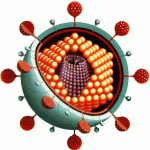Virology
|
2 september 2014 18:34:58 |
| Repair rather than segregation of damage is the optimal unicellular aging strategy (Epidemiologic Perspectives & Innovations) |
|
Tweet Background:
How aging, being unfavourable for the individual, can evolve is one of the fundamental problems of biology. Evidence for aging in unicellular organisms is far from conclusive. Some studies found aging even in symmetrically dividing unicellular species; others did not find aging in the same, or in different, unicellular species, or only under stress. Mathematical models suggested that segregation of non-genetic damage, as an aging strategy, would increase fitness. However, these models failed to consider repair as an alternative strategy or did not properly account for the benefits of repair. We used a new and improved individual-based model to examine rigorously the effect of a range of aging strategies on fitness in various environments.
Results:
Repair of damage emerges as the best strategy despite its fitness costs, since it immediately increases growth rate. There is an optimal investment in repair that outperforms damage segregation in well-mixed, lasting and benign environments over a wide range of parameter values. Damage segregation becomes beneficial, and only in combination with repair, when three factors are combined: (i) the rate of damage accumulation is high, (ii) damage is toxic and (iii) efficiency of repair is low. In contrast to previous models, our model predicts that unicellular organisms should have active mechanisms to repair damage rather than age by segregating damage. Indeed, as predicted, all organisms have evolved active mechanisms of repair whilst aging in unicellular organisms is absent or minimal under benign conditions, apart from microorganisms with a different ecology, inhabiting short-lived environments strongly favouring early reproduction rather than longevity.
Conclusions:
Aging confers no fitness advantage for unicellular organisms in lasting environments under benign conditions, since repair of non-genetic damage is better than damage segregation. |
| 107 viewsCategory: Pathology, Virology |
 Developing and evaluating health education learning package (HELP) to control soil-transmitted helminth infections among Orang Asli children in Malaysia (Epidemiologic Perspectives & Innovations) Developing and evaluating health education learning package (HELP) to control soil-transmitted helminth infections among Orang Asli children in Malaysia (Epidemiologic Perspectives & Innovations)Feasibility of repellent use in a context of increasing outdoor transmission: a qualitative study in rural Tanzania (Epidemiologic Perspectives & Innovations) 
|
| blog comments powered by Disqus |
MyJournals.org
The latest issues of all your favorite science journals on one page
The latest issues of all your favorite science journals on one page



